The Extra Mile Points of Light Volunteer Pathway
A One-Mile Journey Highlighting the Importance of Civic Engagement and Service.
A One-Mile Journey Highlighting the Importance of Civic Engagement and Service.
A One-Mile Journey Highlighting the Importance of Civic Engagement and Service.
The Extra Mile — Points of Light Volunteer Pathways is a mile-long walking path in the heart of Washington, D.C., honoring the actions and commitment to service of famous Americans who have transformed the nation and the world.
Just blocks from the White House, the monument begins at the corner of Pennsylvania Avenue and 15th Street, continues north on 15th Street to G Street NW, then east on G Street to 13th Street. Formed by a series of bronze medallions creating the historic one-mile walking path, the monument honors individuals whose actions and commitment to service have transformed our nation and the world. As honorees medallions are added in future years, the pathway will continue down G Street.
Created in honor of President George H.W. Bush and Barbara Bush, The Extra Mile is dedicated to the spirit of service in America. On Oct. 14, 2005, President and Mrs. Bush dedicated The Extra Mile – Points of Light Volunteer Pathway, inducting its first 20 honorees. To date, 33 medallions have been placed, paying tribute to the work of 36 individuals. The pathway stands as a permanent representation of the president’s enduring legacy of service, and it is the only monument in the nation created to honor everyday citizens for the extraordinary work they’ve done to create meaningful, lasting change in their country and around the world.
Through the monument, we honor civil and human rights leaders, and founders of some of the world’s most important social change institutions. In doing so, we tell the connected story of how the actions of these individual trailblazers turned into powerful movements that shaped history, and continue to influence our world today.
Founder, Hull House
Founder, Eastern Seals
Founder, National Retired Teacher's Associations (NRTA) and American Associations of Retired Persons (AARP)
American Women's Rights Activist
American Civil Liberties Union (ACLU)
Founder, American Red Cross
Founder, World Federation of Mental Health
Founders, Volunteers of America; Co-Founder, National Parent Teacher Association
Founder, Boys Scouts of America (BSA)
Co-Founder, Cooperative for Assistance and Relief Everywhere (CARE)
American Marine Biologist, Author and Conservationist
Co-Founder, United Farm Workers of America
Founder, Big Brothers Big Sisters Mentoring Movement
American Advocate
American Social Reformer, Abolitionist, Orator, Writer and Statesman
Founders, Habitat for Humanity
Founder, American Federation of Labor (AFL)
Founder, Girls Scouts of United States
Founders, Camp Fire USA
President, Boys and Girls Club of America
Founder, Rotary International
Founder, Goodwill Industries
Business Person, Lion's Club
Political Activist, Lecturer, American Foundation for the Blind
Founder, Special Olympics
Founder, Civil Rights Activist, Minister, Spokesperson, Southern Christian Leadership Conference
Co-Founder, Sierra Club
Principal Founders, National Association for the Advancement of Colored People (NAACP)
Founders, Alcoholic Anonymous
Co-Founders, National Urban League
American Abolitionist and Political Activist
American Educator, Author, Orator, and Adviser to Multiple Presidents of the United States
Co-Founder, National Association for the Advancement of Colored People
In 1889, with Ellen Gates Starr, Jane Addams founded Hull House in Chicago, one of the nation’s first settlement houses. It served as a community center for the poor and its success helped lead to the creation of hundreds of similar organizations in communities across the country. An active reformer throughout her career, Jane Addams was a leader in the women’s suffrage and pacifist movements. She was the first American woman to receive a Nobel Peace Prize in 1931.
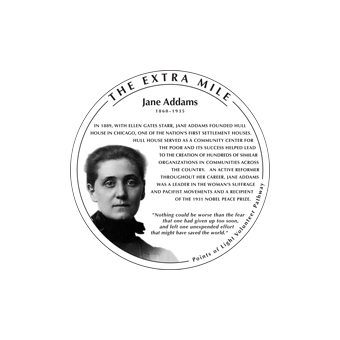
In 1889, with Ellen Gates Starr, Jane Addams founded Hull House in Chicago, one of the nation’s first settlement houses. It served as a community center for the poor and its success helped lead to the creation of hundreds of similar organizations in communities across the country. An active reformer throughout her career, Jane Addams was a leader in the women’s suffrage and pacifist movements. She was the first American woman to receive a Nobel Peace Prize in 1931.

A life-changing experience led Edgar “Daddy” Allen to found an organization that became Easter Seals in 1919. From the construction of one hospital in Ohio, Easter Seals has grown to serve more than one million clients in every state and Puerto Rico. Easter Seals creates solutions that change lives and assures that children and adults with disabilities can live with equality, dignity and independence. Easter Seals services include programs for children, vocational training, and employment and medical rehabilitation.
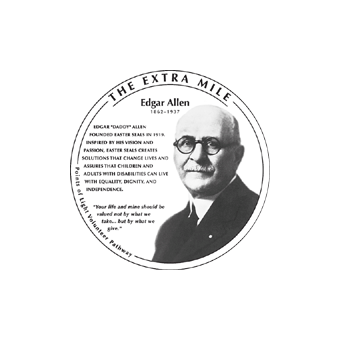
A life-changing experience led Edgar “Daddy” Allen to found an organization that became Easter Seals in 1919. From the construction of one hospital in Ohio, Easter Seals has grown to serve more than one million clients in every state and Puerto Rico. Easter Seals creates solutions that change lives and assures that children and adults with disabilities can live with equality, dignity and independence. Easter Seals services include programs for children, vocational training, and employment and medical rehabilitation.

Dr. Ethel Percy Andrus saw value and worth where others may not have – in the older members of our society. She knew that older Americans could contribute to the welfare of our country and affect positive social change in a democratic society. With these ideas in mind, Andrus founded the National Retired Teachers Association (NRTA) in 1947 and the American Association of Retired Persons (AARP) in 1958. Both have established the importance older members of our society make. The AARP has become a powerful presence, with more than 35 million members aged 50 and older.
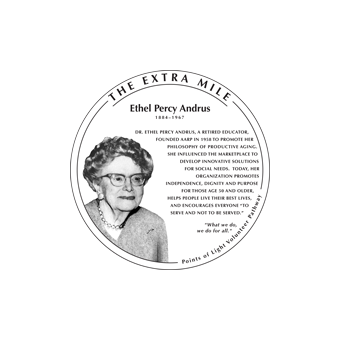
Dr. Ethel Percy Andrus saw value and worth where others may not have – in the older members of our society. She knew that older Americans could contribute to the welfare of our country and affect positive social change in a democratic society. With these ideas in mind, Andrus founded the National Retired Teachers Association (NRTA) in 1947 and the American Association of Retired Persons (AARP) in 1958. Both have established the importance older members of our society make. The AARP has become a powerful presence, with more than 35 million members aged 50 and older.

Blessed with an industrious and self-disciplined spirit, Susan B. Anthony persevered through the prejudice and culture of her time to emerge as the architect of a movement which secured the passage of the 19th Amendment that gave women the right to vote. Her belief that U.S. citizenry entitled everyone to the same rights under the constitution formed her platform for lifelong activism.
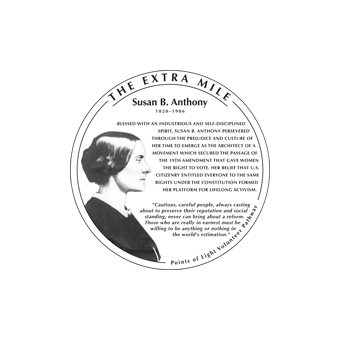
Blessed with an industrious and self-disciplined spirit, Susan B. Anthony persevered through the prejudice and culture of her time to emerge as the architect of a movement which secured the passage of the 19th Amendment that gave women the right to vote. Her belief that U.S. citizenry entitled everyone to the same rights under the constitution formed her platform for lifelong activism.

Roger Nash Baldwin passionately believed in the protection of individual liberty. In 1920, Baldwin and his fellow reformers established the American Civil Liberties Union (ACLU) to ensure that the Bill of Rights would be preserved for each new generation. As its founding director, Baldwin used his 30-year tenure to move the ACLU towards its place as the most renowned public interest law firm in America.
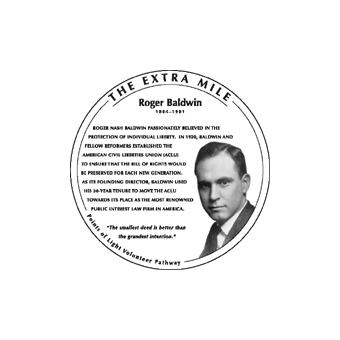
Roger Nash Baldwin passionately believed in the protection of individual liberty. In 1920, Baldwin and his fellow reformers established the American Civil Liberties Union (ACLU) to ensure that the Bill of Rights would be preserved for each new generation. As its founding director, Baldwin used his 30-year tenure to move the ACLU towards its place as the most renowned public interest law firm in America.

Clara Barton lived a lifetime of tireless service to others. During the American Civil War, she became known as the “Angel of the Battlefield,” delivering supplies and caring for the sick and wounded. After the war, Barton organized a campaign to locate missing soldiers. Her enduring legacy was the founding, in 1881, of the American Red Cross, an organization whose name became synonymous with disaster preparedness, response and relief.
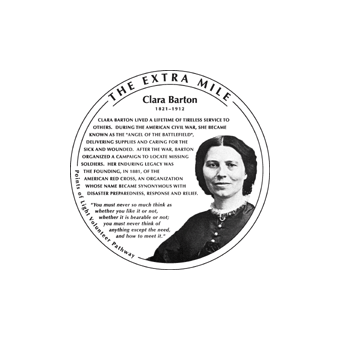
Clara Barton lived a lifetime of tireless service to others. During the American Civil War, she became known as the “Angel of the Battlefield,” delivering supplies and caring for the sick and wounded. After the war, Barton organized a campaign to locate missing soldiers. Her enduring legacy was the founding, in 1881, of the American Red Cross, an organization whose name became synonymous with disaster preparedness, response and relief.

Clifford Beers is the founder of the modern day mental health movement. He established the International Committee for Mental Hygiene in 1931, known today as the World Federation for Mental Health. Beers courageously shared his own experience with mental illness in his autobiography, “A Mind That Found Itself.” This renowned book opened the nation’s eyes to the mistreatment of people with mental illness and led to the creation of modern treatment methods for mental health disorders. Because of his humility, courage and vision, the creation of the National Mental Health Association was realized— revolutionizing and changing people’s attitudes and misconceptions regarding mental illness and its proper diagnoses and management.
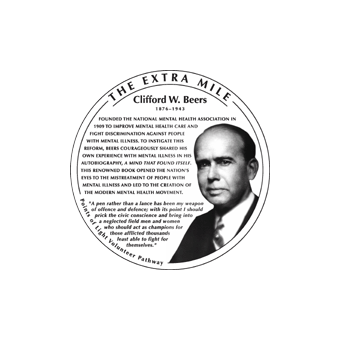
Clifford Beers is the founder of the modern day mental health movement. He established the International Committee for Mental Hygiene in 1931, known today as the World Federation for Mental Health. Beers courageously shared his own experience with mental illness in his autobiography, “A Mind That Found Itself.” This renowned book opened the nation’s eyes to the mistreatment of people with mental illness and led to the creation of modern treatment methods for mental health disorders. Because of his humility, courage and vision, the creation of the National Mental Health Association was realized— revolutionizing and changing people’s attitudes and misconceptions regarding mental illness and its proper diagnoses and management.

Ballington and Maud Booth founded Volunteers of America in 1896 with the mission to reach and uplift all people. The Booths envisioned a movement that would care for the whole person – mind, body and spirit. Their vision lives on in a national organization that provides services to help children, the elderly, people with disabilities, the homeless and others in need. Maud Booth was the greatest single influence in securing political support for prison reform. She was also a founding member of the National Parent Teacher Association (PTA).
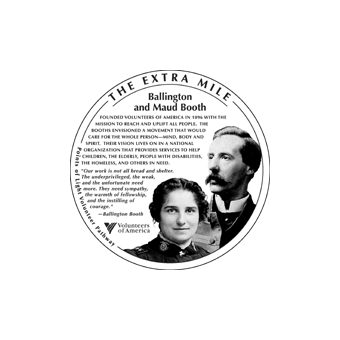
Ballington and Maud Booth founded Volunteers of America in 1896 with the mission to reach and uplift all people. The Booths envisioned a movement that would care for the whole person – mind, body and spirit. Their vision lives on in a national organization that provides services to help children, the elderly, people with disabilities, the homeless and others in need. Maud Booth was the greatest single influence in securing political support for prison reform. She was also a founding member of the National Parent Teacher Association (PTA).

William Dickson W.D. Boyce used his childhood experiences and his success as an international publisher and businessman to create the Boy Scouts of America (BSA). Inspired by the good turn of an unknown English scout, W.D. Boyce brought scouting to the United States in 1910, making it possible for millions of young Americans to benefit from its values-based educational programs.
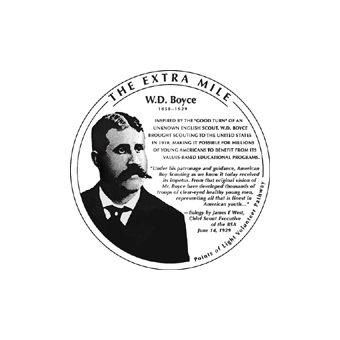
William Dickson W.D. Boyce used his childhood experiences and his success as an international publisher and businessman to create the Boy Scouts of America (BSA). Inspired by the good turn of an unknown English scout, W.D. Boyce brought scouting to the United States in 1910, making it possible for millions of young Americans to benefit from its values-based educational programs.

Wallace Campbell, together with Lincoln Clark and Arthur Ringland, founded Cooperative for Assistance and Relief Everywhere (CARE) in 1945 to rush lifesaving assistance to the survivors of World War II in Europe and Asia. More than 100 million relief packages were delivered, embedding the phrase “care package” into the American lexicon as a term synonymous with helping people in need. Campbell’s 40-year association with CARE helped it evolve toward a model of self-sufficient programs that create lasting solutions to the problems of poverty.
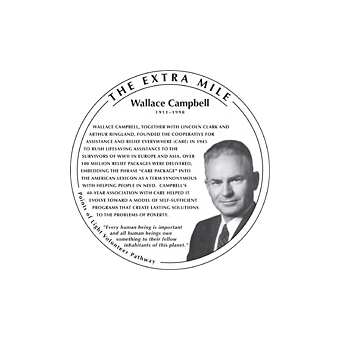
Wallace Campbell, together with Lincoln Clark and Arthur Ringland, founded Cooperative for Assistance and Relief Everywhere (CARE) in 1945 to rush lifesaving assistance to the survivors of World War II in Europe and Asia. More than 100 million relief packages were delivered, embedding the phrase “care package” into the American lexicon as a term synonymous with helping people in need. Campbell’s 40-year association with CARE helped it evolve toward a model of self-sufficient programs that create lasting solutions to the problems of poverty.

Rachel Carson’s philosophy of conservation and the desire for people to coexist peacefully with nature guided her contributions to the preservation of the environment, and the human race. Her love of nature and her eloquent literary style laid the groundwork for the modern day environmental movement. In 1962, she wrote “Silent Spring,” a passionate expose of the far-reaching indiscriminate use of pesticides. Her work became the catalyst for an environmental philosophy that sought to promote the respectful coexistence of mankind and the environment
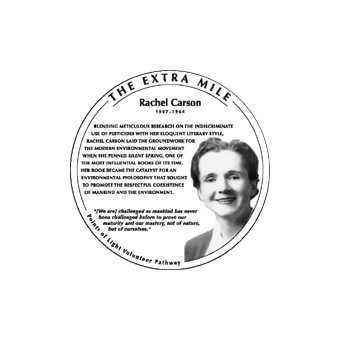
Rachel Carson’s philosophy of conservation and the desire for people to coexist peacefully with nature guided her contributions to the preservation of the environment, and the human race. Her love of nature and her eloquent literary style laid the groundwork for the modern day environmental movement. In 1962, she wrote “Silent Spring,” a passionate expose of the far-reaching indiscriminate use of pesticides. Her work became the catalyst for an environmental philosophy that sought to promote the respectful coexistence of mankind and the environment

Led by his desire to secure a better quality of life for migrant farm workers, Cesar Chavez helped found the United Farm Workers for America (UFW), the first effective farm workers’ union in the United States. Under his leadership of nonviolent protest, the UFW was able to secure improved wages and benefits, more humane living and working conditions and better job security for some of the poorest workers in America. Through his life of service, Chavez provided inspiration to countless others.
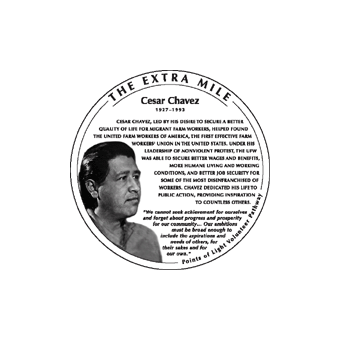
Led by his desire to secure a better quality of life for migrant farm workers, Cesar Chavez helped found the United Farm Workers for America (UFW), the first effective farm workers’ union in the United States. Under his leadership of nonviolent protest, the UFW was able to secure improved wages and benefits, more humane living and working conditions and better job security for some of the poorest workers in America. Through his life of service, Chavez provided inspiration to countless others.

Ernest K. Coulter’s enduring contribution is the founding, in 1904, of the Big Brothers Big Sisters youth mentoring movement. Coulter lived a life of purpose and passion. Social welfare activist, journalist, lecturer, author, lawyer and advocate for children’s rights – Coulter offered a lifetime of service to others.
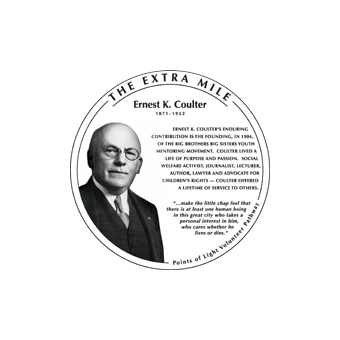
Ernest K. Coulter’s enduring contribution is the founding, in 1904, of the Big Brothers Big Sisters youth mentoring movement. Coulter lived a life of purpose and passion. Social welfare activist, journalist, lecturer, author, lawyer and advocate for children’s rights – Coulter offered a lifetime of service to others.

Inspired by her social conscience, Dorothea Dix launched a self-financed career aimed at improving the lives of the mentally ill. Her mission to document squalid institutional living conditions and inhumane treatment built public awareness and redefined political thought, leading to better treatment practices.
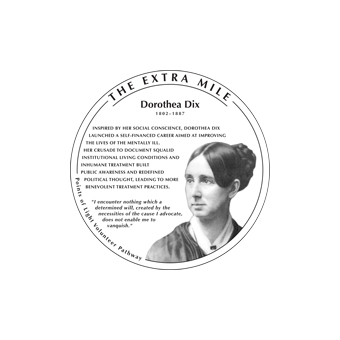
Inspired by her social conscience, Dorothea Dix launched a self-financed career aimed at improving the lives of the mentally ill. Her mission to document squalid institutional living conditions and inhumane treatment built public awareness and redefined political thought, leading to better treatment practices.

Famed orator and writer Frederick Douglass was also a key architect of the movement that ended slavery, the very institution into which he was born. Even after his goal to abolish slavery was achieved, Douglass persisted in his struggle for equality. His work in the women’s rights and civil rights movements helped set the stage for further landmark change in this country.
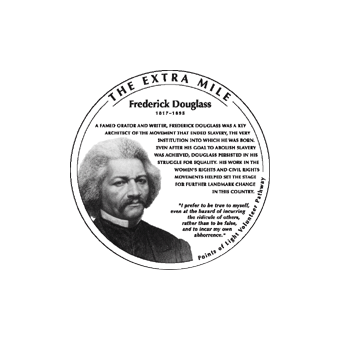
Famed orator and writer Frederick Douglass was also a key architect of the movement that ended slavery, the very institution into which he was born. Even after his goal to abolish slavery was achieved, Douglass persisted in his struggle for equality. His work in the women’s rights and civil rights movements helped set the stage for further landmark change in this country.

Millard and Linda Fuller founded Habitat for Humanity, a Christian organization with “open arms” to all who want to be involved, to build affordable houses. Habitat for Humanity requires that the families who live in the homes participate in the building of them. Habitat has built more than 800,000 homes for families in more than 1,700 U.S. cities and 70 countries worldwide. Through the work of Habitat, over 1 million families have been served since it’s founding in 1976.
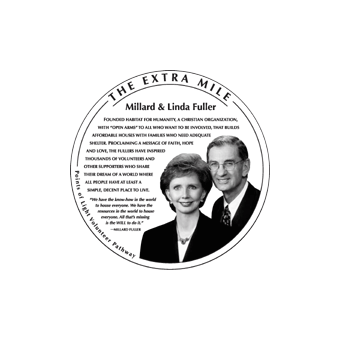
Millard and Linda Fuller founded Habitat for Humanity, a Christian organization with “open arms” to all who want to be involved, to build affordable houses. Habitat for Humanity requires that the families who live in the homes participate in the building of them. Habitat has built more than 800,000 homes for families in more than 1,700 U.S. cities and 70 countries worldwide. Through the work of Habitat, over 1 million families have been served since it’s founding in 1976.

As founder and 37-year president of the American Federation of Labor (AFL), Samuel Gompers is credited with winning unprecedented rights and protections for the American worker. Never wavering in his belief that power for the worker lay in collective action and honest negotiation, Gompers experienced unequaled success in organizing millions of laborers into a single national organization.
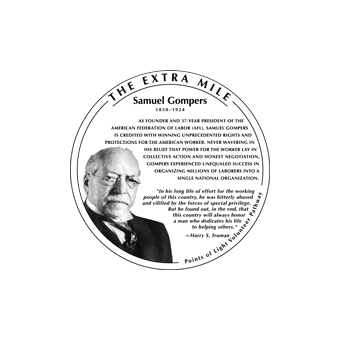
As founder and 37-year president of the American Federation of Labor (AFL), Samuel Gompers is credited with winning unprecedented rights and protections for the American worker. Never wavering in his belief that power for the worker lay in collective action and honest negotiation, Gompers experienced unequaled success in organizing millions of laborers into a single national organization.

Juliette Gordon Low founded Girl Scouts of the United States of America in 1912 for girls to develop and strengthen leadership skills; to provide support, kindness and compassion to those in need; and to prepare to serve as responsible citizens. Her efforts have enabled millions of girls, from 5 to 17, to enjoy fun, friendship and learning opportunities in a nurturing Girl Scout environment. She was an environmentalist, a crusader, a woman dedicated to the service of others. Above all, she was certain the future belonged to the young.
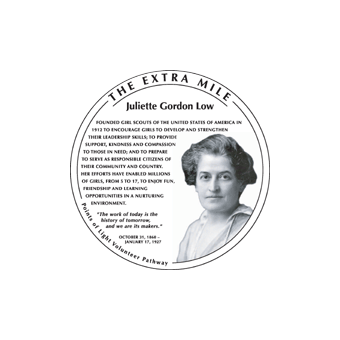
Juliette Gordon Low founded Girl Scouts of the United States of America in 1912 for girls to develop and strengthen leadership skills; to provide support, kindness and compassion to those in need; and to prepare to serve as responsible citizens. Her efforts have enabled millions of girls, from 5 to 17, to enjoy fun, friendship and learning opportunities in a nurturing Girl Scout environment. She was an environmentalist, a crusader, a woman dedicated to the service of others. Above all, she was certain the future belonged to the young.

Luther and Charlotte Gulick founded Camp Fire in 1910 as America’s first nonsectarian, interracial organization for girls. Boys joined in 1975. The organization provided opportunities and real-life lessons that contributed to the development of the “whole” person: giving service, pursuing knowledge, glorifying work and achievement, and being happy. Today, through programs such as the core after-school curriculum, youth leadership, in-school programming, service-learning, and camping and environmental education, Camp Fire USA helps build caring, confident youth and future leaders.
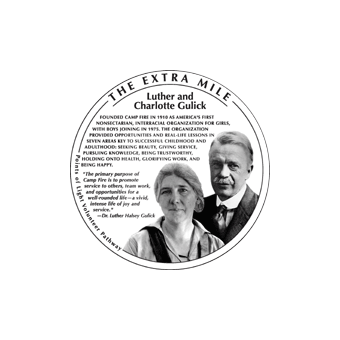
Luther and Charlotte Gulick founded Camp Fire in 1910 as America’s first nonsectarian, interracial organization for girls. Boys joined in 1975. The organization provided opportunities and real-life lessons that contributed to the development of the “whole” person: giving service, pursuing knowledge, glorifying work and achievement, and being happy. Today, through programs such as the core after-school curriculum, youth leadership, in-school programming, service-learning, and camping and environmental education, Camp Fire USA helps build caring, confident youth and future leaders.

William Edwin Hall served as the unpaid president of the Boys and Girls Clubs of America for nearly four decades. Through his leadership, it grew to become one of America’s pre-eminent charities, offering children a safe harbor and teaching them to become productive, responsible and caring citizens. His guidance and leadership took the organization from 43 Boys’ Clubs to more than 375 clubs and 350,000 members when he retired in 1954. It has been said that he, more than any one person, made it possible to offer young boys (and now girls) an alternative to a life of delinquency and unhappiness.
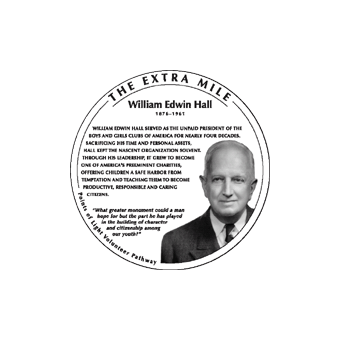
William Edwin Hall served as the unpaid president of the Boys and Girls Clubs of America for nearly four decades. Through his leadership, it grew to become one of America’s pre-eminent charities, offering children a safe harbor and teaching them to become productive, responsible and caring citizens. His guidance and leadership took the organization from 43 Boys’ Clubs to more than 375 clubs and 350,000 members when he retired in 1954. It has been said that he, more than any one person, made it possible to offer young boys (and now girls) an alternative to a life of delinquency and unhappiness.

Inspired by the simple idea of combining fellowship and service, Paul Harris pioneered the service club movement with the founding of Rotary International. Rotary fulfilled his dream of a worldwide organization of business and professional people serving their communities and promoting international understanding. Rotary continues to expand global horizons through its educational programs and offers hope through its humanitarian efforts and public health campaigns.
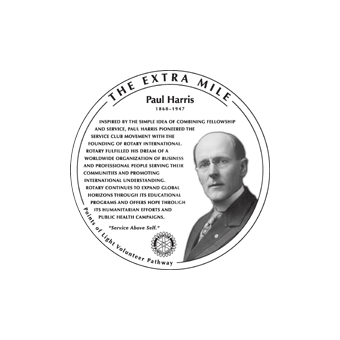
Inspired by the simple idea of combining fellowship and service, Paul Harris pioneered the service club movement with the founding of Rotary International. Rotary fulfilled his dream of a worldwide organization of business and professional people serving their communities and promoting international understanding. Rotary continues to expand global horizons through its educational programs and offers hope through its humanitarian efforts and public health campaigns.

Edgar J. Helms founded Goodwill Industries in 1902 to help people with disabilities and disadvantages fully participate in society by expanding their occupational capabilities. To accomplish this mission, Helms created an innovative system whereby Goodwill collects used items from the community and sells them in Goodwill stores to fund its employment, training and job placement programs.
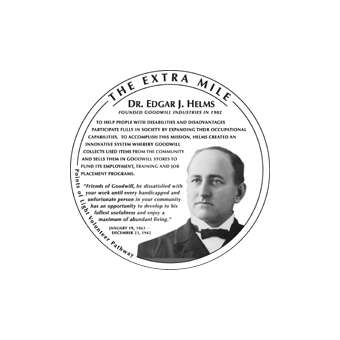
Edgar J. Helms founded Goodwill Industries in 1902 to help people with disabilities and disadvantages fully participate in society by expanding their occupational capabilities. To accomplish this mission, Helms created an innovative system whereby Goodwill collects used items from the community and sells them in Goodwill stores to fund its employment, training and job placement programs.

Believing in the power of cooperative altruism, Melvin Jones helped shape Lions Club International into the largest network of services clubs in the world. The organization is committed to assisting the visually impaired and supporting sight conservation worldwide. Using the motto, “We Serve,” Lions Clubs seek to improve the lives of the needy and offer young people the chance to catch the spirit of service.
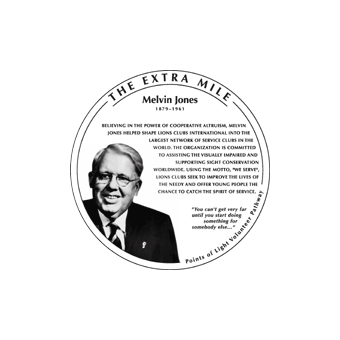
Believing in the power of cooperative altruism, Melvin Jones helped shape Lions Club International into the largest network of services clubs in the world. The organization is committed to assisting the visually impaired and supporting sight conservation worldwide. Using the motto, “We Serve,” Lions Clubs seek to improve the lives of the needy and offer young people the chance to catch the spirit of service.

A blind and deaf writer and activist, Helen Keller was the guiding force behind the American Foundation for the Blind. Keller devoted her life to expanding possibilities for people who are deaf-blind, blind or have low vision. She also campaigned for women’s suffrage and workers’ rights.
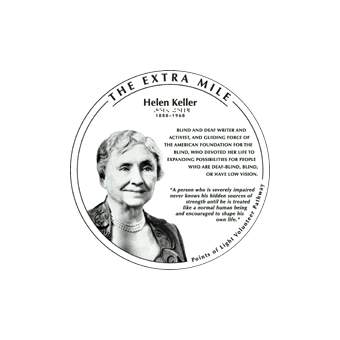
A blind and deaf writer and activist, Helen Keller was the guiding force behind the American Foundation for the Blind. Keller devoted her life to expanding possibilities for people who are deaf-blind, blind or have low vision. She also campaigned for women’s suffrage and workers’ rights.

When Eunice Kennedy Shriver founded Special Olympics in 1968, she envisioned a program of athletic competition for people with mental and developmental disabilities that sidelined prejudice and substituted opportunity and understanding. Through her advocacy, she has brought to millions of lives what all people deserve: A chance to experience self-worth, a chance to connect with their fellow man, a chance to live without walls.
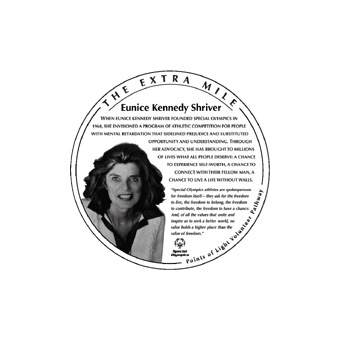
When Eunice Kennedy Shriver founded Special Olympics in 1968, she envisioned a program of athletic competition for people with mental and developmental disabilities that sidelined prejudice and substituted opportunity and understanding. Through her advocacy, she has brought to millions of lives what all people deserve: A chance to experience self-worth, a chance to connect with their fellow man, a chance to live without walls.

In founding the Southern Christian Leadership Conference, Dr. Martin Luther King, Jr. gave momentum to the civil rights movement. Dr. King’s persistent efforts, inspiring oratory and non-violent protests, despite physical attacks, death threats and retaliatory violence, brought America closer to his dream of equality for all.
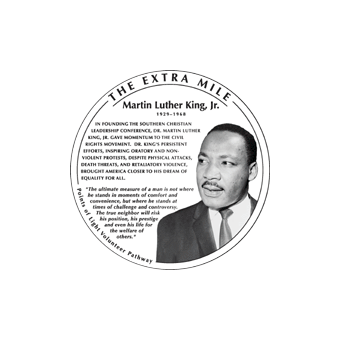
In founding the Southern Christian Leadership Conference, Dr. Martin Luther King, Jr. gave momentum to the civil rights movement. Dr. King’s persistent efforts, inspiring oratory and non-violent protests, despite physical attacks, death threats and retaliatory violence, brought America closer to his dream of equality for all.

John Muir, a conservationist, preservationist, explorer, writer, inventor, farmer and naturalist is credited, along with Theodore Roosevelt, as being the father of our national parks system. He was also one of the founders of the Sierra Club, one of the largest conservation advocacy groups in the United States. Through his publications and other advocacy, Muir helped educate leaders, and the American public, about the need for preservation of wild lands and the animals that inhabit those areas. This advocacy initiated the conservation movement in the United States.
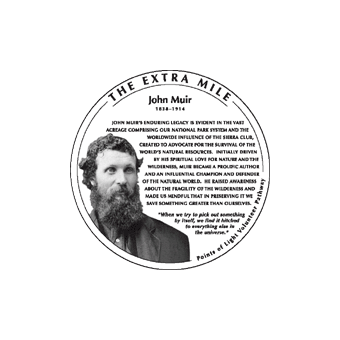
John Muir, a conservationist, preservationist, explorer, writer, inventor, farmer and naturalist is credited, along with Theodore Roosevelt, as being the father of our national parks system. He was also one of the founders of the Sierra Club, one of the largest conservation advocacy groups in the United States. Through his publications and other advocacy, Muir helped educate leaders, and the American public, about the need for preservation of wild lands and the animals that inhabit those areas. This advocacy initiated the conservation movement in the United States.

Mary White Ovington and William Edward Burghardt (W.E.B.) DuBois were the two principal founders of the National Association for the Advancement of Colored People (NAACP) in 1909. Ovington was one of the people that issued “the call” to civil rights activists of the time to form the organization. DuBois was among the most influential black leaders of the 20th century. He helped form the “Niagara Movement” as a way to work for an end to segregation, discrimination and the denial of voting and civil rights. He was among those who responded to Ovington’s “call” and merged his group into the NAACP.
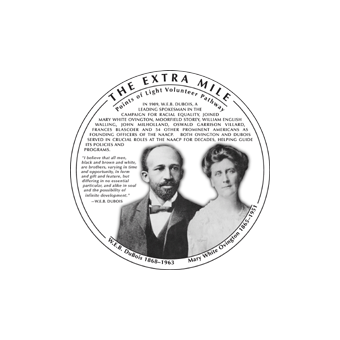
Mary White Ovington and William Edward Burghardt (W.E.B.) DuBois were the two principal founders of the National Association for the Advancement of Colored People (NAACP) in 1909. Ovington was one of the people that issued “the call” to civil rights activists of the time to form the organization. DuBois was among the most influential black leaders of the 20th century. He helped form the “Niagara Movement” as a way to work for an end to segregation, discrimination and the denial of voting and civil rights. He was among those who responded to Ovington’s “call” and merged his group into the NAACP.

United in their search for sobriety, Dr. Bob and Bill W. established Alcoholics Anonymous in 1935 allowing men and women to share with one another their experience, strength and hope in order to carry the message of recovery to alcoholics seeking help. Their belief and experience would provide the basis for AA and, most importantly, the concept of the Twelve Step program. This program, also embraced by other groups such as Narcotics Anonymous and Gamblers Anonymous, represents hope for all those who have a desire to address their addiction.
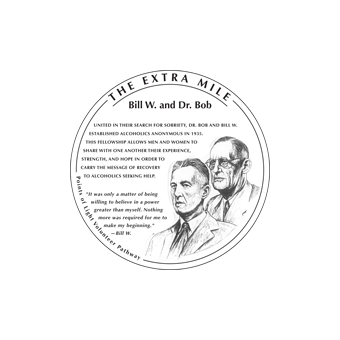
United in their search for sobriety, Dr. Bob and Bill W. established Alcoholics Anonymous in 1935 allowing men and women to share with one another their experience, strength and hope in order to carry the message of recovery to alcoholics seeking help. Their belief and experience would provide the basis for AA and, most importantly, the concept of the Twelve Step program. This program, also embraced by other groups such as Narcotics Anonymous and Gamblers Anonymous, represents hope for all those who have a desire to address their addiction.

The National Urban League was established in 1910 through the efforts of George Edmund Haynes and Ruth Standish Baldwin, the Urban League is the nation’s oldest and largest community- based movement devoted to empowering African Americans to enter the economic and social mainstream. The mission of the Urban League movement is to enable African Americans to secure economic self-reliance, parity, power and civil rights.
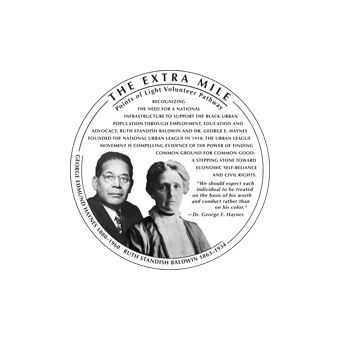
The National Urban League was established in 1910 through the efforts of George Edmund Haynes and Ruth Standish Baldwin, the Urban League is the nation’s oldest and largest community- based movement devoted to empowering African Americans to enter the economic and social mainstream. The mission of the Urban League movement is to enable African Americans to secure economic self-reliance, parity, power and civil rights.

Harriet Tubman escaped a life of slavery only to return south, at her own peril, time and again, to lead more than 300 fugitive slaves through the Underground Railroad to safety and freedom. After the Civil War, Tubman raised money to clothe and educate newly freed African-American children and established a home for and indigent African-Americans.
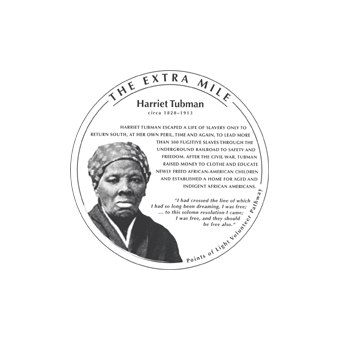
Harriet Tubman escaped a life of slavery only to return south, at her own peril, time and again, to lead more than 300 fugitive slaves through the Underground Railroad to safety and freedom. After the Civil War, Tubman raised money to clothe and educate newly freed African-American children and established a home for and indigent African-Americans.

As an influential African-American, living in a time of escalating segregation, Booker T. Washington negotiated a course between accommodation and progress in advocating greater civil rights for blacks. His philosophy of “request” not “protest” allowed him to gain the respect of presidents and politicians. Washington believed education was a cornerstone for the advancement of blacks and his efforts to raise money for his beloved Tuskegee Institute helped secure its well-deserved reputation as a leading educational institution for African Americans.
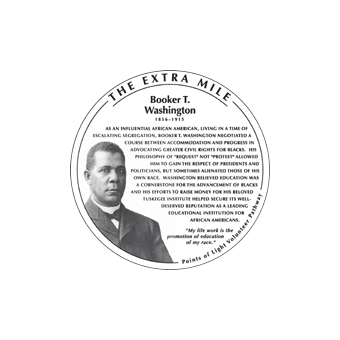
As an influential African-American, living in a time of escalating segregation, Booker T. Washington negotiated a course between accommodation and progress in advocating greater civil rights for blacks. His philosophy of “request” not “protest” allowed him to gain the respect of presidents and politicians. Washington believed education was a cornerstone for the advancement of blacks and his efforts to raise money for his beloved Tuskegee Institute helped secure its well-deserved reputation as a leading educational institution for African Americans.

Ida Wells-Barnett crusaded aggressively for civil rights her entire life and was unafraid to exercise those rights when custom ran contrary to the law. Involved in many civil rights causes, she played leadership roles in the women’s suffrage movement and in the founding of the NAACP. Ida Wells-Barnett became the era’s most outspoken crusader for ending the practice of lynching African-Americans.
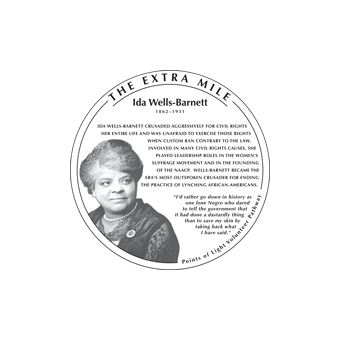
Ida Wells-Barnett crusaded aggressively for civil rights her entire life and was unafraid to exercise those rights when custom ran contrary to the law. Involved in many civil rights causes, she played leadership roles in the women’s suffrage movement and in the founding of the NAACP. Ida Wells-Barnett became the era’s most outspoken crusader for ending the practice of lynching African-Americans.
